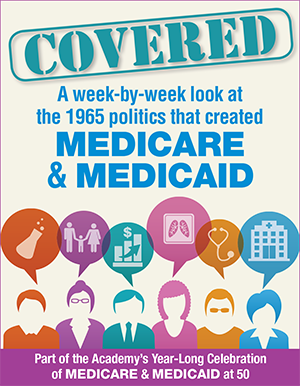Bob Rosenblatt, Special Correspondent
Throughout 2015, the Academy is working with partners to create a platform for dialogue around the history and future of these two vital programs, including this weekly Covered blog series. Covered is written by Bob Rosenblatt, a Senior Fellow at the National Academy of Social Insurance and editor of the website HelpWithAging. Learn more about the Academy’s celebration of the 50th anniversary of Medicare and Medicaid.
Private Insurance Plans Will Run New Federal Health Program for Seniors
May 29, 1965
By Bob Rosenblatt, Special Correspondent
The health insurance industry will enjoy a bonanza under the proposed Medicare program, gaining 20 million new clients over the age of 65.
The Johnson Administration and Congress agree that Blue Cross and other insurance carriers should process the hospital and doctors’ bills under the massive expansion of coverage in the legislation.
This would place substantial economic power in the hands of insurance officials. As the legislation is currently written, insurance company officials will have substantial authority to decide on payment levels for medical care. The proposed law, approved by the House last month, only mentions the payment of “reasonable” charges without precise definitions.
The Medicare bill has been approved by the House, and seems assured of Senate passage. It requires the federal government “to contract with health insurance carriers for the performance of functions related to such coverage — for example, determining the amounts to be paid for physicians’ services and making the payments,” Anthony Celebrezze, Secretary of Health, Education and Welfare, told the Senate Finance Committee on April 29.
“Groups of hospitals or associations of hospitals on behalf of their members could nominate an organization to act as a fiscal intermediary between providers and the federal government,” he said.
Medicare would create a universal hospital benefit for Americans over the age 65. It would be funded by a new Social Security tax on workers and their employers. A second program, covering charges at the doctor’s office, would be voluntary, financed by a $3 a month premium paid by individuals and $3 paid by the federal government. Administration officials expect 80 to 90 percent of people over 65 would enroll in this program.
There would be a third layer in the legislative cake, a major expansion of federal funds going to the states for “Medical Assistance for the Aged,” a welfare program for those too poor to pay their medical bills.
The combination of programs would create a huge new outlay of federal funds, apparently without any significant restriction on payments. The taxpayers would provide the cash going to hospitals and doctors, but the insurers, hospitals and doctors would be the parties deciding on the size of the payments.
The American Medical Association is strongly opposed to the legislation and many in the business community and conservative members of Congress all are deeply skeptical about government involvement in the delivery of health care. Their concern prompted the authors of the legislation in the Administration and Congress to offer assurances that the system won’t be radically changed. This means the insurers would administer the operation of the new Medicare benefits.
Insurers say they are the only ones equipped to deal with the complexities of health care billing and administration.
The Medicare bill would create a complex layer cake of programs and benefits, Walter J. McNerney, president of the Blue Cross Association, told the Senate Finance Committee on May 5.
“A major task lies ahead in coordinating the benefits when an episode of illness cuts across two or three different designs and even philosophies of operation,” McNerney said. “A sick man or woman who begins to use care after enactment of this legislation would need detailed instruction in many instances to find his way through.”
He offered examples of complexity: A $40 deductible for each stay of illness in a hospital, but only a $20 deductible if someone gets diagnostic care as an outpatient. And then there is the $50 annual deductible for visits to a doctor’s office. But if the patient is poor enough, and qualifies for welfare in his home state, the state will pay all or part of the $50 deductible.
The government is not equipped to handle the bills but needs to know what care the patient is receiving, and what that care costs. The “basic system of recordkeeping needs to be fitted into the process of claims evaluation, reimbursement, and review rather than primarily into the fiscal records of government,” McNerney said.
Medicare’s passage is likely this year, with benefits starting in 1966. It would be the biggest expansion of government benefits since the creation of Social Security 30 years ago. And it looks as if nobody in the government will regulate or challenge the size of the checks that will be flowing to doctors and hospitals.
► Directory of COVERED posts
► Read the next post in the COVERED series, “Medicare Would Allow Expanded Benefits for Workers in Unions”
► Learn more about the Academy’s celebration of the 50th anniversary of the enactment of Medicare and Medicaid

